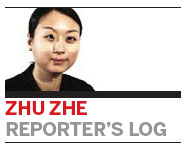Reporter's log: asking question on the scene
Updated: 2012-11-08 07:42
By Zhu Zhe (China Daily)
|
||||||||
As the battle for the White House ended in the United States, the curtain was being raised at the biggest political event in China in a decade, with the first news conference of the 18th National Congress of the Communist Party of China.
Such a coincidence left journalists little time to take a breath.

Compared with the annual "two sessions" in China - the plenary sessions of the National People's Congress and the National Committee of the Chinese People's Political Consultative Conference, the Party congress allows far fewer authorized reporters, which makes the task of each journalist much greater.
As I've had successful experience asking questions at major news conferences at previous two sessions, my colleagues had high expectations of me, which made me quite nervous.
And the question China Daily prepared is whether the recent investigation into former senior officials Bo Xilai and Liu Zhijun shows a stronger determination by the Party to fight corruption.
I arrived about an hour and a half before the news conference's scheduled start at 4:30 pm, in order to get a good seat.
I picked the third row to the left of the moderator, as experience told me that sitting in the middle or the front row might not be favorable because the moderator sometimes deliberately ignores reporters sitting nearby and offers the chance to reporters further away.
But sitting too far away is no good, as the moderator might miss you in such a big crowd of hundreds of reporters. So sitting in the third or fourth row may be your best chance.
To draw the attention of the moderator, I was dressed in red. Red is the color of China and the Party, and red is conspicuous. The last time I got a chance to ask Premier Wen Jiabao a question at a news conference in 2009, I was in light blue, a color which is also easy to distinguish in a crowd.
Another tip is to have constant eye contact with the moderator and smile at him often.
If the moderator notices you, he will give you feedback, such as nodding at you slightly. If so, the chance of asking a question becomes much greater.
Thanks to all my experience and luck, I was successful again.
The moment I got the microphone, my nervousness disappeared.
I asked the question about corruption. The spokesman gave a firm and clear answer: anti-corruption will be high on the agenda of the Party congress and no official, no matter how high his or her level is, can escape punishment for corruption.
Then I received many text messages from colleagues, friends and relatives, all praising the question as they said it's one that Chinese people want to ask the most.
They also spoke highly of my performance on TV, saying I was more mature than three years ago, when I asked Premier Wen a question.
My reply read: "That's the natural result of time, as I'm getting old."
Contact the writer at zhuzhe@chinadaily.com.cn

 Relief reaches isolated village
Relief reaches isolated village
 Rainfall poses new threats to quake-hit region
Rainfall poses new threats to quake-hit region
 Funerals begin for Boston bombing victims
Funerals begin for Boston bombing victims
 Quake takeaway from China's Air Force
Quake takeaway from China's Air Force
 Obama celebrates young inventors at science fair
Obama celebrates young inventors at science fair
 Earth Day marked around the world
Earth Day marked around the world
 Volunteer team helping students find sense of normalcy
Volunteer team helping students find sense of normalcy
 Ethnic groups quick to join rescue efforts
Ethnic groups quick to join rescue efforts
Most Viewed
Editor's Picks

|

|

|

|

|

|
Today's Top News
Health new priority for quake zone
Xi meets US top military officer
Japan's boats driven out of Diaoyu
China mulls online shopping legislation
Bird flu death toll rises to 22
Putin appoints new ambassador to China
Japanese ships blocked from Diaoyu Islands
Inspired by Guan, more Chinese pick up golf
US Weekly

|

|







